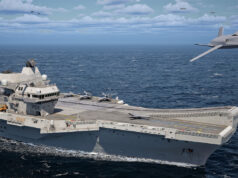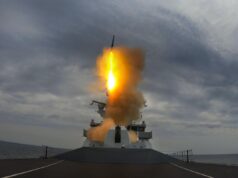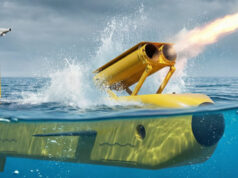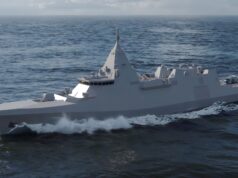In an era where social media serves as a conduit for information, the risk of misinformation spreading is ever more present.
A tweet by esteemed Scottish journalist Ruth Wishart recently ignited debate over the control of Trident.
This article is a fact checking article, if you believe we’ve made an error you can submit a correction in line with our correction policy.
While her concerns appear rooted in the question of national sovereignty—a subject of crucial importance to many—her statement is incorrect. Here we’ll look at why it’s crucial to be well-informed about such a high-stakes issue.
“We don’t have an independent nuclear ‘deterrent’ – we couldn’t deploy so much as a peashooter without US say so – but actually harbouring America’s own nuclear arsenal would be beyond the pale. Another reason to decouple from the Trident-loving UK.”
We don't have an independent nuclear "deterrent" – we couldn't deploy so much as a peashooter without US say so – but actually harbouring America's own nuclear arsenal would be beyond the pale. Another reason to decouple from the Trident loving UK.
— ruth wishart (@ruth_wishart) September 1, 2023
Though provocative and widely disseminated, the tweet perpetuates a common misunderstanding about the UK’s Trident missile system. Contrary to popular belief, the United Kingdom retains full operational control over its Trident missiles—a point confirmed by multiple official sources, including Freedom of Information requests.
However, the tweet muddies the waters of an already intricate debate, blurring the lines between public understanding and the realities of national defence.
A Brief Overview of the Trident System
The Trident missile system, operated by the Royal Navy, serves as the cornerstone of the United Kingdom’s strategic nuclear deterrent. Based on four Vanguard-class submarines, this complex system is designed for high levels of stealth and can remain underwater for up to three months. Below, we elaborate on its various components, history, and the unique features that set it apart, such as the absence of a permissive action link system and the concept of the “letters of last resort.”
The Trident system’s origins can be traced back to the Cold War, a period marked by heightened nuclear tensions. Replacing the Polaris missile system, Trident became operational in the mid-1990s with its Trident II D5 Submarine-Launched Ballistic Missiles (SLBMs) mounted on Vanguard-class submarines.
Each submarine is capable of carrying up to 16 Trident II D5 SLBMs, although the current policy limits each vessel to eight operational missiles. These missiles can reach targets over 7,000 miles away and are incredibly accurate, owing to advanced navigation systems. Each missile can also carry multiple independently targetable reentry vehicles (MIRVs), each with a yield of up to 100 kilotons.
Notably, the UK’s Trident system does not employ a permissive action link (PAL) system, which would require codes or hardware to enable a launch. This design feature means that the operational control is solely in British hands. A ‘two-person rule’ is observed at every operational level, from the Prime Minister down to the submarine crew, to minimise the risks of an accidental or unauthorised launch.
An intriguing aspect of the Trident system is the existence of the “letters of last resort.” These are handwritten instructions from the sitting Prime Minister, sealed and stored in each of the four Vanguard-class submarines. These letters outline the actions to be taken by the submarine commander in the event that the UK government has been incapacitated by a nuclear strike. The letters are destroyed unopened whenever a new Prime Minister takes office.
The Trident system undergoes routine upkeep and modernisation. While the missiles themselves are of American design and are leased from the U.S., British-designed warheads are fitted onto them.
The Complexities of American Involvement
Despite operational independence, the UK’s relationship with the US in terms of defence is undeniably intricate. Although Britain has the technical capacity to launch Trident without American consent, the political likelihood of this happening is another matter.
A recent report by the Defence Select Committee emphasised the unlikelihood of Trident’s use for any purpose other than to “give legitimacy to a US nuclear attack by participating in it.”
This interdependence is not simply technological but deeply rooted in strategic and diplomatic considerations.
Another circulating myth is that Trident missiles utilise American GPS and require US launch codes for activation. In fact, Trident employs a stellar sighting guidance system and inertial navigation, thus not requiring any GPS. Additionally, British Trident warheads can be launched under the command of a submarine commander, with the support of his crew, without any external coded authorisation.
In short, Britain could launch them without consulting the U.S. but such a situation would be very unlikely.
Why Ruth Wishart’s Tweet Is Inaccurate
Ruth Wishart’s tweet suggests that the UK “couldn’t deploy so much as a peashooter without US say so,” which is not accurate. Whilst it’s fair to argue that the UK would be unlikely to employ its nuclear arsenal without consulting its American allies, this is a matter of geopolitics rather than operational control.
The UK has full operational sovereignty over its Trident system and could technically launch it independently of the United States. By suggesting otherwise, the tweet distorts the realities of British defence capabilities and contributes to the spread of misinformation.
Although the UK technically possesses the independent capability to deploy its Trident missiles, there is a strong case to suggest that it would be unlikely to do so without prior American approval, owing to intricate geopolitical considerations. Nonetheless, to claim that Britain lacks any operational control over its Trident system is both misleading and counterproductive, only serving to propagate misinformation in an age already rife with it.
Hence, the onus falls upon us to exercise due diligence in ensuring that public discourse is informed and accurate, particularly when it pertains to matters of national security.














These nationalists are so full of hatred they will say anything to discredit the UK. I don’t believe a word they say untill I have verified it for myself.
This is why they are increasingly unpopular in Scotland, their not even nationalists but largely rabid greens and middle class “socialists”.
One point that almost no one mentions is that the entire UK nuclear arsenal is designed for and deployed to provide nuclear counter force on behalf of NATO in conjunction with the US. People still talk of our old Moscow strategy as being our nuclear posture but this was an old V force strategy, continued with Polaris. Since the deployment of trident II our posture is nuclear counter force.
Our nuclear weapons are effectively anti nuclear weapons designed to take out Russia’s land based ICBM’s in minutes. Not attack civilian centres.
Henry Kissinger was is favour of leasing Trident to the U.K. precisely because it created another level of uncertainty in addition to the U.S.S.R’s deliberations should it threaten to use force to achieve its goals.
Ms Wishart (like the Church of England’s Synod last century in its deliberation on the U.K.’s nuclear weapons) side steps any issue with France’s nuclear deterrent. Who controls that?
Yes the concept of independent deterrent was certainly useful in the face of a Soviet Threat however now it’s morphed into the only weapon system able to take out the one card Mad Vlad can play on the world stage (his nuclear arsenal)
Which probably he has only half the capacity of what he says he has. Bloody mad Vlad. 🤣🤣🤣
Well said. Was going to put post up myself, but you hit the nail on the head 👍👍
Yawn, these people are so dumb they are beyond educating.
This independent control issue was considered way back in the Polaris days 60 years ago.
Its why the UK missiles have always had an entirely UK designed and built front end so we maintain compete control over their targeting and use. Only the rocket part is from shared US/UK stocks, the business end is all ours and got sweet F A to do with uncle Sam.
If the unthinkable were to happen, and a British city hit with a nuclear weapon, there is no way on earth the US would try to retaliate on our behalf (why would they countenance such a risk?). The deterrent is our guarantor of survival.
it is incredible we have it. I wish it was truly independent (I.e. all built in the UK), but it is an incredible legacy of Lord Mountbatten he managed to secure Polaris and nuclear submarine technology from the Americans to short cut the development here in the UK. It’s what AUKUS is equally incredible as an agreement.
Harold McMillan secured Polaris from the Americans in the Nassau agreement with JFK. I had not before heard of Mountbatten’s role.
Mountbatten was a personal friend of Admiral Hyman Rickover (father of the US nuclear submarine) he had unilateral control over all things nuke in the USN for nearly 2 decades. McMillan got JFKs signature because Mountbatten had done the hard work priming the man who could actually share the information and technology.
Most historians say that the Nassau meeting over three days and the subsequent Agreement for the US to supply Polaris was to enable Kennedy and Macmillan to end the Skybolt crisis. Kennedy had agreed with McNamara’s proposal to cancel Skybolt on 23 November 1962. The Nassau Agreement was signed on 21 December 1962.
Not sure when Mountbatten did his 2 years of shmoozing with Rickover.
Pleased to see this. Journalists aye…
Well written, balanced and informative article Tom.
Thank you
CR
It certainly is but I will disagree with that last sentence: “Hence, the onus falls upon us to exercise due diligence in ensuring that public discourse is informed and accurate, particularly when it pertains to matters of national security.”
Government has always had a role in policing the public square, but it has been The Wild West since the internet came along, as we have left it to private companies to deal with, in lieu of large increases to police budgets. For years it has seemed obvious that there is a huge business opportunity for a social media company that respected privacy and truth, but it just has not happened. Instead, we have had a series of events culminating with Elon Musk’s purchase and dismantling of the most intellectual and news-oriented social media site there is: Twitter. His corrupt action of doing away with any identity check (the blue check mark) and making it paid-for-by-anyone is particularly egregious and also likely criminal. This is all happening 7 years after the documented manipulation of Facebook users helped elect Trump and at the dawn of AI. Nobody will argue that a democracy rests on informed voters. At what point do we recognize that our current handling of social media is entirely incongruent with keeping our cherished democracies?
If Biden chose to show his anti-British feelings by ceasing the maintenance of UK pooled missiles, how long would it be before we could no longer mount the CASD?
Hard to say, but it’s worth noting Iran is still flying F14 after 40 years of a US embargo and 20 years since the US retired the aircraft.
Changing out the solid fuel rocket motors after 20 years for sure, the electronics should be good for at-least two to three decades.
It would depend on how old the missiles were to begin with and if they had been remanufactured as part of Trident sustainment.
Good thing is no one else would know so it would still be a highly effective deterrent.
Long enough for whatever problematic president or congress to be replaced or long enough to do a crash build with a British M51 provided by MBDA.
Sounds about right, though I suspect the UK’s attitude to risk may be a bit different to Iran’s.
Not when it comes to keeping a Nuclear deterrent vs loosing it, I’m sure we could bodge it for long enough to build an alternative should the US ever try to block us from maintenance of the missiles.
I am sure we could learn how to maintain the missile bodies and motors. It is not rocket science! ..or there again, perhaps it is !
🤣🤣🤣
Hi folks hope all is well.
A very good article, set’s out many aspects clearly and what many of us on this site already know.
The issue I have is that most of the public mainly down to maine stream media, have an illusion that the UK is unable to use Trident without the US permission. For example, the article on this site will not be in the majority in the public domain.
I’m guessing (and hope I’m wrong) Ruth Wishart’s version will be reported without correction, especially the BBC, ITV and other claptrap platforms.
Cheers,
George
The BBC have been a pretty good source of information about the nuclear deterrent and how it works. Probably the best documentary on the subject was The Human Button by Peter Hennessy on Radio 4. It’s available here if anyone wants to listen to it.
https://youtu.be/aNV1q82OZ58?si=DvrYDwdlFXY54Vvw
I’m not sure the majority of the population know or care, they would have probably cared about a multi billion dollar missile project in the 70’s or 80’s that would likely have been canceled like so much else back then.
The UK is in a much better position to build a Trident replacement now, the cost of something like the M51 program was only around €4 billion.
However it would be seen as greatly weakening NATO.
Of all the major military powers, the UK is the biggest advocate for NATO having been the key player in founding the western alliance.
The USA and France have all made serious calls from their leaders in the past few years to disband NATO.
Any leader making such a call in the UK would be taken out the back and shot behind the toilets.
Even the SNP are pro NATO.
‘I don’t care what itr costs! I want one with a great big Union Jack on it!‘
– Ernest Bevin (whose portrait bust prominently stands inside the Foreign Office to this day.) Post War Labour Foreign Secretary Bevin had just returned from a meeting with U.S. officials where they made it plain the U.S. would not give any further financial assistance to Great Britain in any direction.
Always amazing to me that the Labour Party set us on the road to being a nuclear weapons power – and decades later contracted for two amazing aircraft carriers thus keeping the RN as a blue-water navy.
That’s saying something if the SMP are for
Really? I had the British public down as being a bit better informed than that.
‘Hence, the onus falls upon us to exercise due diligence in ensuring that public discourse is informed and accurate, particularly when it pertains to matters of national security.’
Precisely. However, that interpretation would not serve as well Ms Wishart’s intentions as I understand them. I actually believe the U.K. independent deterrent is incidental to the argument Ms Wishart has every right to make regarding the Union.
Don’t let knowledge, truth or experience muddy the waters for a journos effort at stirring up nonsense with their chuff! But there’s an agenda here, for the simple fact it’s SNP policy and as a Scottish “journalist” it seems apparent where her political allegiance may lie!
It’s worth remembering the SNP does not really have “policy”. It’s a desperate band of independence supporters with many band wagons like CND and Trans rights that have come and gone over the years.
Old policies like Trident removal hand around because they are not actually policy just a future wish list.
6,000 jobs on the Clyde is a big argument for retaining Trident.
We have had some say the same on this site.
They are wrong.
So I opened up her tweet and saw her answer to George:
https://i.postimg.cc/Wpgx6RX2/Opera-Snapshot-2023-09-02-194918-twitter-com.png
Does anybody know what language “American” is?
Of course the manuals for a US product are produced in America. So what?
That is so tangential to the issue of command and control.
An excellent factual article by Tom. However there is one part I disagree with, the part where he describes Ruth as a journalist.
I think this article is good, how it brings out that we could launch without the Americans, we wouldn’t and that also applies to the French as well.
In the event of things getting that serious, it would likely be a co-ordinated launch by all 3.
The point of the UK having nuclear weapons is to enable the political power of US as well as the UK in keeping Russia and China under pressure.
I was following this on the hellsite and particularly liked her “Even the manuals are American..” as proof that they have final use approval over the system.
I’m not sure I agree with the article that “there is a strong case to suggest that it would be unlikely to do so without prior American approval”.
I think the chances of the UK firing Trident as a first use is vanishingly small, and although I’d grant in that case there would be US involvement, approval might be too high a bar. The chances of us using second strike are considerably higher, although I’d hope they were pretty small too. As I understand it, there are two mechanisms by which that might happen. The Prime Minister orders it from some bunker somewhere after the UK has been all but destroyed, or the submarine captain decides that no more orders will be coming following the UK’s destruction and opens the letter.
With neither second-strike mechanism do I believe the Americans would be consulted. Geopolitics would have already been destroyed. It could be argued that the whole point of the UK and France having an independent deterrent is that even if Russia calculates the US would allow European nuclear destruction without reply, it would still be deterred knowing Britain and France could fire back against US wishes.
Hard to believe that US would wait to be sure where Soviet ICBMs were going rather than to launch their ICBMs once their satellites had identified the Soviet launch.
That’s the process of mutually assured distruction.
What a silly woman. Her comments are ignorant. We consult with allies all the time, and would do so especially if we were minded to fire live Trident missiles against an enemy. The US provides maintenence support for the missile bodies/motors and allows us (and support us) to do test launches off the US coast; they have no operational control over the use of our missiles.
Her comment ‘but actually harbouring America’s own nuclear arsenal would be beyond the pale’ – is absurd. In the Cold War many hundreds of US nuclear warheads would no doubt have been stored in the UK for use by US aircraft stationed here.
She is Scottish – surely she knows that US SSBNs were ‘harboured’ for decades in Scotland…at Holy Loch.